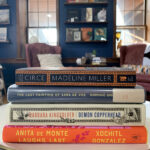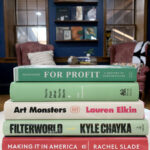
One Thursday morning in May, I leave my allergist’s office, headed towards a mundane Costco run, when a small plastic sign next to a United Methodist church causes me to abruptly change course.
It reads “East Shore Library Book Sale. Thursday – Friday -Saturday.”
Over the past year, I’ve developed an obsession for library book sales, fueled in no small part by the website booksalefinder.com, a gem I stumbled upon one day that looks like it was built in 1996. Since that discovery, I track the book sales for central Pennsylvania, dutifully making note of the nearby ones in my paper planner.
But this book sale has escaped my radar. I pull into the parking lot of the church because my first assumption is that it might be there. The Annville Library hosts theirs at a church.
A cursory glance around tells me there is no book sale taking place, and a quick search on my phone reveals the sale is taking place at the library itself. About a mile in the opposite direction of where I’m supposed to be going. But I tell myself I’ll be quick and punch the library into my phone’s GPS.
I’ve become enough of a book sale veteran in the last year that I know to bring a bag or two along for the occasion. But I am wholly unprepared for this one and I don’t have a spare bag in my car. That’s ok, I tell myself, it means I won’t buy as much.
Once in the library, it takes me a moment to get my bearings. When I first started my foray into the world of book sales, I was strictly a non-fiction reader, and my favorite finds have always been old books on art and even older books on craft. But in the last few months, I’ve gotten back into fiction, and I stand for a moment, torn between an overwhelming selection of novels and my inability to locate the non-fiction sections I typically gravitate towards.
My eyes land on the art section in the back, but I am disappointed. Most of the books are newer than my taste – I’m a sucker for 1960s and 70s college art survey textbooks – and I notice with some chagrin there are a few books – museum exhibition catalogs mostly, that I already have in my collection.
In front of the art section is a table labeled “classics” and I scan a few books before moving on. (The Annville Library sale last month had much better classics finds.) I wander to the small sci-fi section and pick up a paperback copy of iRobot, the one released after the movie with Will Smith on the cover. I keep meaning to borrow it from my brother when I visit, so this seems worth a dollar and the trip, even if I find nothing else.
I realize the sale opens into a hallway and discover the trove of non-fiction I’ve been missing. I pick up a rather thick book on creating an anti-capitalist business and a novel by Gertrude Stein that is clearly mis-shelved. I find the craft section, but like art, the books aren’t old enough for my taste. I think about calling it quits at this point, but decide to make one last sweep of the paperback novels.
I’ve got a few more books in my hand at this point, with the plan that my lack of shopping bag will keep things in check, when a nice volunteer hands me a red plastic shopping basket. “You look like you need this,” she says kindly. Well now I’m in it, I think.
I move down the line of novels, which, in atypical book sale form (at least in my experience) are arranged alphabetically by author, when a book catches my eye.
Sourdough by Robin Sloan. What are the odds? I was just looking at this book online last night. It goes in the basket, along with a few other finds that I remember noticing in my web browsing and being intrigued by at some point.
The woman next to me comments that she needs to stop, but neither of us do, we just keep moving down the line in sync. She suggests a few books to me, but I’m not sure our tastes are as aligned as our movements, and I just smile politely and nod. The basket is full enough now that I’m not sure how I’ll carry the books to the car, so I decide to call it quits.
At the table in the front an older gentleman gives my final tally. 10 books, $14 dollars. I pay him in cash and leave.
A few days later, I’m sitting in our camper, reading Sourdough, and it suddenly hits me why I’ve become so obsessed with used book sales. And no, it’s not the thrill of a bargain.
It’s a form of entertainment that is entirely untraceable.
There is no record. No one keeps a list of the books that are donated. No one keeps a list of the books that are bought. I paid in cash. There is no credit card transaction. I believe the gentleman marked down the total number of books and the amount I paid on a little clipboard, but my name was never given. For all intents and purposes, this transaction never happened.
There are a few scant digital clues. My phone knows where I’ve been. I snap a picture of my stack of books glistening in the sunlight on the back seat of my car, which I post to my Instagram stories, immortalizing it on the Internet for a full 24 hours.
But when every piece of entertainment we consume online is obsessively tracked, this entire experience feels more than quaint. It feels…. free.
I know that I will eventually stack Sourdough with the other books I’ve finished in May and post it to my blog. Since the pandemic, it’s become my way of tracking what I’ve read.
But there is no algorithm that knows I read this book. No platform recorded my transaction and compressed it into data that is fed back to me with the goal of “helping” me purchase something else down the road. There is nothing that tells other readers that I, along with a cohort of other people, finished the book in a certain length of time, or underlined a popular passage, or abandoned the book 67% of the way through.
I want to be honest here. The fact that this book came into my hands was not wholly without the influence of the Internet. I had come across it the day before by browsing a website that lets you input a book you’ve enjoyed, and it will give you similar suggestions. I don’t know the technical details of this website, but unlike booksalefinder.com, it does not look like it was built in the 90s, and I’m sure algorithms are involved.
The damn things are so hard to escape these days.
But in a world that feels increasingly influenced by algorithms, even a minor escape feels like a victory.
There was a time when I didn’t think these algorithms were all bad. One of my favorite pastimes is browsing a certain smile-branded website to see what books other customers purchased alongside whatever book I am looking at. But for me, this is an extension of my favorite graduate school pastime – requesting as many books as I could from the library based on what was in the bibliography of whatever book I was currently reading. For graduate students who were also faculty – which I was – there was no limit on the amount of books you could take from the library. Before moving out of my studio, it took me weeks to return the sixty or so books I had accumulated, carrying an armful or two back to the library every day at lunch.
But that specific joy is getting harder to come by, as the recommendations the smile site feeds me are more and more often tailored to what it thinks I will like, rather than showing me an amalgamation of what other people have bought. Sometimes I try to trick the site, logging out of my account or opening an incognito browser. I want to see what other people are looking at, not what an algorithm thinks I want.
Yet more and more, these algorithmically generated recommendations are branded as discovery.
It doesn’t feel that way. I’ve always viewed discovery as a process of following breadcrumbs, at least, or especially, when it comes to books. I’ve always prided myself in my ability to fall down a rabbit hole.
But the rabbit hole has changed. Or maybe a rabbit hole is the wrong metaphor. Perhaps it’s more like pulling strings. Finding a thread and following it to see where it leads, what other threads it intersects with along the way.
Now, in our algorithmically-driven world, it can easily feel like the threads are pulling us, even if we try to avoid them. Since I’ve started baking with sourdough myself – months before I came across the novel of the same name – both my husband and sister have been inundated on Instagram with videos showing what to do with your sourdough discard. They DM them to me, and the algorithm takes that for interest and keeps showing them more.
It’s tight and efficient, guaranteed to produce content that keeps us scrolling by showing us what we’ve already expressed interest in.
But what I love about the process of discovery is that it’s not efficient. It’s slow, and there are plenty of dead ends, but even more wonderful tangents that you never planned on. It’s the feeling when you come into a well-researched book expecting one thing, and end up discovering something entirely new.
Used book sales are the epitome of the messy process of discovery. Sometimes they are a total bust, and other times you walk out with the best gems. A book with the major works from the Metropolitan Museum of Art for a dollar. An old copy of To Kill a Mockingbird with the loveliest cover. An anthology of utopian writing with the William Morris novel you keep thinking you should read but haven’t gotten around to ordering online. The book that you screenshotted the night before while pulling at bookish threads on your phone.
And the algorithm knows none of this.
I realize there’s an irony to writing this and publishing it on the Internet. I know that there are now bots skimming my every word, crawling whatever image I’ve chosen to accompany this post, no doubt as fodder to feed some hungry AI beast. I know that the beautiful secret I’ve kept from the Internet is no longer a secret.
But this is a secret I’ve willingly given. And for every book I’ve mentioned, there are ten more sitting on my bookshelves without any digital trace. At any moment, I could grab one of the other books I purchased at the book sale, the ones whose spines were turned the wrong way in the picture, the ones I never shared online, and begin to read with blissful untraceability.
For that is the gift of the library book sale. Not the bargains. (Though those are good too.) Instead, it’s the knowledge that, even if for a moment, I’ve grasped a form of entertainment, of escape, of joy, that is untracked, untraced. That, if only for a moment, my actions belong to me and only me. And that it is my choice, and only my choice, if and when I want to share that experience with anyone else.




Leave a Reply